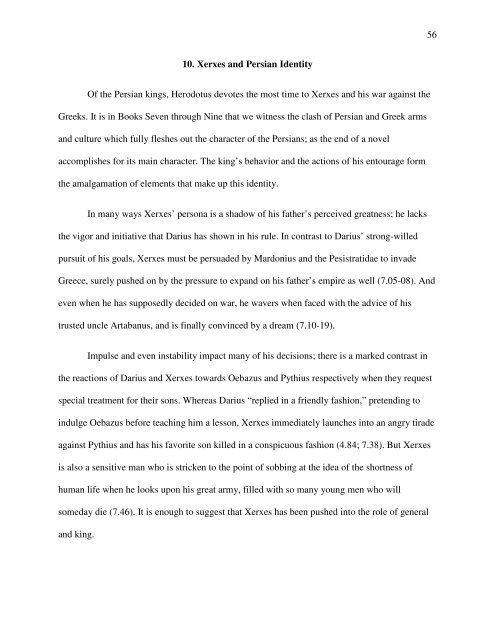The Old and the Restless - The Egyptians and the Scythians in Herodotus' Histories by Robert J. Hagan
Create successful ePaper yourself
Turn your PDF publications into a flip-book with our unique Google optimized e-Paper software.
56<br />
10. Xerxes <strong>and</strong> Persian Identity<br />
Of <strong>the</strong> Persian k<strong>in</strong>gs, Herodotus devotes <strong>the</strong> most time to Xerxes <strong>and</strong> his war aga<strong>in</strong>st <strong>the</strong><br />
Greeks. It is <strong>in</strong> Books Seven through N<strong>in</strong>e that we witness <strong>the</strong> clash of Persian <strong>and</strong> Greek arms<br />
<strong>and</strong> culture which fully fleshes out <strong>the</strong> character of <strong>the</strong> Persians; as <strong>the</strong> end of a novel<br />
accomplishes for its ma<strong>in</strong> character. <strong>The</strong> k<strong>in</strong>g’s behavior <strong>and</strong> <strong>the</strong> actions of his entourage form<br />
<strong>the</strong> amalgamation of elements that make up this identity.<br />
In many ways Xerxes’ persona is a shadow of his fa<strong>the</strong>r’s perceived greatness; he lacks<br />
<strong>the</strong> vigor <strong>and</strong> <strong>in</strong>itiative that Darius has shown <strong>in</strong> his rule. In contrast to Darius’ strong-willed<br />
pursuit of his goals, Xerxes must be persuaded <strong>by</strong> Mardonius <strong>and</strong> <strong>the</strong> Pesistratidae to <strong>in</strong>vade<br />
Greece, surely pushed on <strong>by</strong> <strong>the</strong> pressure to exp<strong>and</strong> on his fa<strong>the</strong>r’s empire as well (7.05-08). And<br />
even when he has supposedly decided on war, he wavers when faced with <strong>the</strong> advice of his<br />
trusted uncle Artabanus, <strong>and</strong> is f<strong>in</strong>ally conv<strong>in</strong>ced <strong>by</strong> a dream (7.10-19).<br />
Impulse <strong>and</strong> even <strong>in</strong>stability impact many of his decisions; <strong>the</strong>re is a marked contrast <strong>in</strong><br />
<strong>the</strong> reactions of Darius <strong>and</strong> Xerxes towards Oebazus <strong>and</strong> Pythius respectively when <strong>the</strong>y request<br />
special treatment for <strong>the</strong>ir sons. Whereas Darius “replied <strong>in</strong> a friendly fashion,” pretend<strong>in</strong>g to<br />
<strong>in</strong>dulge Oebazus before teach<strong>in</strong>g him a lesson, Xerxes immediately launches <strong>in</strong>to an angry tirade<br />
aga<strong>in</strong>st Pythius <strong>and</strong> has his favorite son killed <strong>in</strong> a conspicuous fashion (4.84; 7.38). But Xerxes<br />
is also a sensitive man who is stricken to <strong>the</strong> po<strong>in</strong>t of sobb<strong>in</strong>g at <strong>the</strong> idea of <strong>the</strong> shortness of<br />
human life when he looks upon his great army, filled with so many young men who will<br />
someday die (7.46). It is enough to suggest that Xerxes has been pushed <strong>in</strong>to <strong>the</strong> role of general<br />
<strong>and</strong> k<strong>in</strong>g.
















